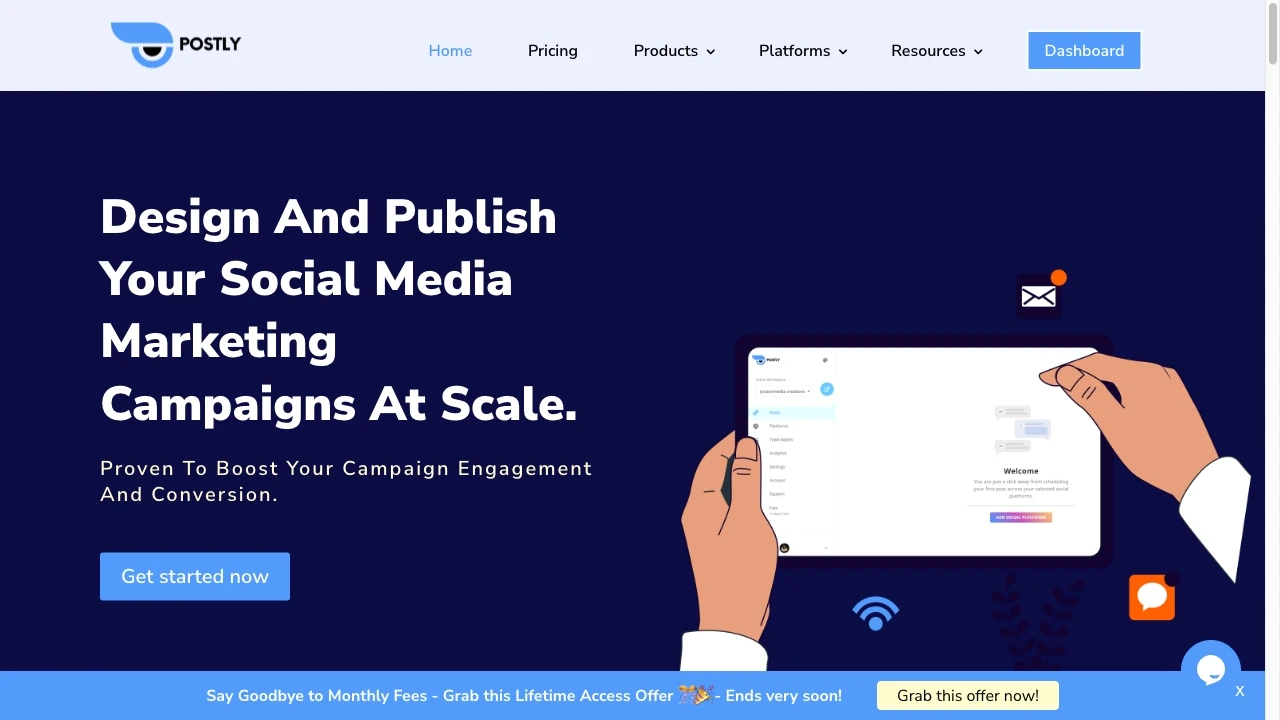Publer contre Postly
Publer et Postly sont des outils de gestion des médias sociaux visant à rationaliser la planification et le marketing de contenu. Lancé en 2019, Publer cible les petites entreprises et les travailleurs indépendants, offrant des fonctionnalités comme la planification, l'analyse et la collaboration. En revanche, Postly, également fondé en 2021, s'adresse à des équipes plus importantes avec une automatisation avancée et des intégrations multiplateformes, améliorant l'efficacité marketing.


Publer
Idéal Pour
Gérer des comptes de médias sociaux
Programmer des publications Instagram
Analyser la performance des publications
Collaborer avec des membres de l'équipe
Forces Clés
Planification simplifiée des réseaux sociaux
Analytique puissante pour le suivi des performances
Fonctionnalités de collaboration pour les équipes
Fonctionnalités principales
AI Assist
Vue du calendrier
Bibliothèque multimédia
Planification en masse
Lien dans la bio
Postly
Idéal Pour
Gestion efficace des campagnes sur les réseaux sociaux pour les entreprises
création de contenu économisant du temps pour les spécialistes du marketing
croissance de l'audience pour les influenceurs individuels
décisions basées sur les données à partir des analyses de campagne
Forces Clés
Gestion des médias sociaux rentable
création de contenu AI qui fait gagner du temps
amélioration de l'engagement du public grâce à la planification
Fonctionnalités principales
Planification alimentée par IA
plateforme de publication prête pour mobile
rédacteur IA pour génération de contenu rentabilisée
publications récurrentes pour retention d'audience
raccourcisseur de liens pour campagnes simplifiées
Popularité
Matrice de décision
| Facteur | Publer | Postly |
|---|---|---|
| Ease of Use |
|
|
| Features |
|
|
| Value for Money |
|
|
| Interface Design |
|
|
| Learning Curve |
|
|
| Customization Options |
|
|
Guide de Décision Rapide
- Vous voulez une planification transparente sur plusieurs plateformes
- Vous visez des analyses avancées pour mesurer la performance des publications
- Vous valorisez une interface conviviale pour une gestion de contenu efficace
- Vous recherchez des fonctionnalités collaboratives pour la création de contenu d'équipe
- Vous voulez des plans économiques sans sacrifier la qualité
- Vous voulez une gestion et planification des médias sociaux efficaces
- Vous visez à augmenter l'engagement avec des suggestions de contenu intelligentes
- Vous appréciez des analyses détaillées pour le suivi des performances.
- Vous cherchez des outils de collaboration pour les flux de travail d'équipe
- Vous recherchez une interface conviviale pour une navigation rapide
Ce que disent nos experts
Publer excelle dans la planification et la gestion de contenu, le rendant idéal pour les entreprises se concentrant sur une publication constante. Il offre des analyses robustes et une interface conviviale. En revanche, Postly brille dans la collaboration d'équipe et les fonctionnalités d'engagement en temps réel, idéal pour les marques ayant besoin d'une interaction dynamique. Les deux font face à des défis d'intégrations ; cependant, la simplicité de Publer facilite la configuration tandis que Postly exige plus d'efforts initiaux. Choisissez en fonction de vos besoins spécifiques : publication régulière vs. engagement actif.
Jamie Davis
Analyste logiciel
À un coup d'œil
Publer excelle par son interface conviviale et ses analyses étendues, ce qui le rend idéal pour les utilisateurs individuels et les petites entreprises recherchant une gestion facile. Postly, avec des fonctionnalités d'automatisation plus avancées, attire les équipes plus importantes ayant besoin d'outils de collaboration robustes. Les avantages de Publer incluent l'accessibilité et la simplicité ; les inconvénients impliquent des intégrations limitées. Les avantages de Postly sont une automatisation puissante, tandis que les inconvénients incluent une courbe d'apprentissage plus raide. Pour les individus, choisissez Publer ; pour les équipes, optez pour Postly.
Tarification et Plans dAbonnement
Publer propose quatre niveaux de prix : Gratuit (jusqu'à 5 comptes), Pro (12€/mois), Premium (24€/mois), et Agence (48€/mois). Postly propose trois plans : Starter (9€/mois), Croissance (24€/mois), et Entreprise (49€/mois). Les deux plateformes n'ont pas de frais cachés. Pour les petites entreprises, le plan Gratuit de Publer est économique, tandis que les entreprises de taille moyenne peuvent préférer le plan Croissance de Postly. Publer offre généralement des fonctionnalités plus complètes pour des coûts légèrement plus élevés.
Métriques de performance
Publer excelle en rapidité avec une planification et une publication plus rapides tandis que Postly offre une grande précision dans les analyses et les indicateurs d'engagement des publications. Les normes de fiabilité montrent que Publer est plus cohérent dans la publication multi-plateforme. En revanche, Postly surpasse dans des scénarios de reporting détaillés. Choisissez Publer pour la rapidité ou Postly pour des insights approfondis et la précision.
Expérience Utilisateur
Publer offre une interface propre et intuitive avec une navigation facile, la rendant conviviale. Ses options de personnalisation répondent à des besoins divers. La courbe d'apprentissage est relativement basse, soutenue par des guides complets. Postly, en revanche, présente un design moderne mais peut avoir une courbe d'apprentissage plus raide en raison de ses fonctionnalités avancées. La personnalisation est correcte, et le support utilisateur comprend des ressources utiles, mais il peut ne pas égaler la documentation d'assistance étendue de Publer.
Intégrations et compatibilité
Publer prend en charge les intégrations avec les principales plateformes comme Facebook Twitter Instagram LinkedIn et Google My Business améliorant l'efficacité du workflow. Postly offre une compatibilité similaire mais met l'accent sur l'analyse en temps réel et les suggestions de contenu pilotées par l'IA optimisant l'engagement des utilisateurs.
Limitations et inconvénients
Les limites de Publer incluent moins d'intégrations et des temps de réponse plus lents. Postly peut avoir du mal avec les analyses avancées et le formatage de contenu. Les inconvénients courants sont la complexité de l'interface utilisateur. Solutions de contournement : utiliser des outils tiers pour l'analyse ou privilégier des types de contenu plus simples.